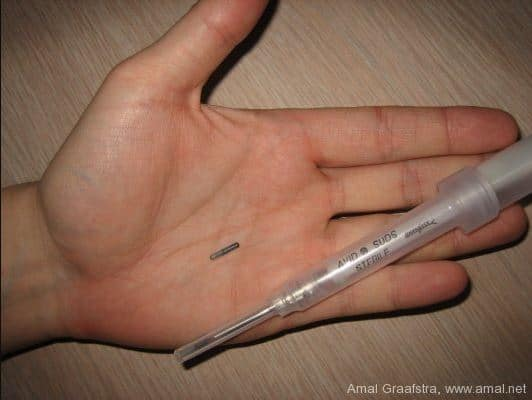In Brave New World, Aldous Huxley describes a world in which Big Brother has coerced people into accepting a surveillance state. Compared to George Orwell’s similarly prophetic masterpiece 1984, Brave New World is much closer to the bone. Nowadays, people have indeed submitted to handing over every detail of their lives to social media sites like Facebook. What many people don’t realize, however, is that their social media data can be mined to discover just about everything about them.
Evidence keeps emerging that intelligence agencies are using social media to discover people’s race, religious affiliation, sexual preferences - even whether they are substance abusers. Advertisers track us, and mandatory data retention laws force Internet Service Providers (ISPs) to store our web browsing histories. What’s more, the Edward Snowden revelations prove that governments are willing to spy on their own citizens.
Down the Rabbit Hole
Now that people know governments are building massive databases about them, awareness about digital privacy has exploded. Naturally, everybody is looking at the next generation of emerging technologies with skepticism. Microchip implants are invasive by their very nature, and with just about every technology so far (the internet, social media, smartphones, facial recognition) being used to snoop on citizens, it seems natural to presume that radio-frequency identification (RFID) chips will do the same thing.
In the book Spychips, Katherine Albrecht and Liz McIntyre bring this frightening notion to life. Their book describes a world in which corporations and governments use chips to track people incessantly. In the first chapter it says:
"One day, these devices could tell management whom you're chatting with at the water cooler and how long you've spent in the restroom - even whether or not you've washed your hands. Our next generation of workers could be conditioned to obediently accept this degrading surveillance through forced early exposure.”
The notion that chip implants might one day become mandatory is immensely disturbing - especially if the can be used to track you. But what is the truth about RFID implants? How malevolent are they really? And what benefits, if any, do they bring to the table that might offset those nefarious capabilities?

Three Square Market
In Sweden, many people have been implanted and are already using microchips. In the forward-thinking Scandinavian country, citizens use RFID chips inserted into their hands to gain entry to gyms, to access the public railway system, to get into work, and to log into computers.
At Three Square Market, in Wisconsin, willing employees have decided to follow in Sweden’s futuristic footsteps. Willing employees have been microchipped by the Swedish firm Biohax. The chip lets those employees open doors, clock in, log in to their computer terminal without a password, and even use vending machines.
To most people, the idea of being chipped for those relatively minor benefits may seem silly, especially if it severely threatens their privacy. Amal Graafstra - one of the leading experts on implanting chips into humans - has a rather different opinion. He has been happily using a chip embedded in his own hand to unlock and start his car, get into his home, unlock a gun, log into his computer without the need for a password - and a whole host of other things - since way back in 2005.

Sleeping Easy
Graafstra is part of a Seattle-based startup called Dangerous Things. He believes that most people are overly alarmist about implants, and, in his opinion, inherently confused about the actual dangers of current RFID technology. According to Graafstra, the detractors who most vehemently criticize microchipping believe the implants do things they simply can’t do.
"It seems that there might be some misunderstanding about what’s possible, and what’s not possible, with chipping. The problem with the definition of the word ‘chipping’, is that it’s up to interpretation mostly informed by Hollywood movies.
"An RFID chip is only really good for identifying something, whether that is a human or a piece of clothing on the shelf at Walmart.”
Graafstra told me that for any implanted chip to become a useful surveillance tool it would have to be vastly different to the chips that are currently in circulation. One day, that kind of tracking may well become possible. For now, however, RFID chips capable of remaining in the human body can only be read from one inch away. This makes it impossible for passive RFID chip implants to be used to do the kind of tracking that detractors of the technology most fear.

More Power Required
At the moment, implants have no power source. And a power source will be necessary if the chips are ever going to evolve into the much-feared spychips of the future. That is not to say it will never happen, just that we're not there yet. Graafstra explains why:
"If you look at what people are saying about the potential negative effects and privacy issues of microchipping, what it boils down to is being able to be ‘scanned’ or ‘read’ or ‘tracked’ somehow without your consent. The reality is that this is not going to happen.
"What might be technically possible, is to set up a high powered reader every square foot of the earth to track somebody in real time to find out where they are. That is technically possible - but it is wholly impractical.”
Positive Attributes
While the negatives of implanting are somewhat non-existent (for the time being), the positive aspects of RFID chips are self-evident. Passwords are the single most insecure part of the current digital identification process. For a password to be truly secure, it needs to be both unique and difficult.
In fact, a password that is truly secure must be so difficult that it can’t be remembered by the average person. Consider just how many services the average person must remember passwords for nowadays, and you start to get a sense of the problem. Implanted chips can be a valid solution.

Even using an RFID implant to gain access to a high-security building, for example, is much more secure than using a key card. A key card can be stolen and can potentially have a higher read range that makes it more prone to hacking. Yes, the code in an implanted chip could also be hacked by making the victim move through an area that has been specifically set up with an antenna to intercept and read the chip. It is technically feasible. However, it is highly unlikely because the implants on the market right now can only be read when they're brought to within an inch of the reader.
Admittedly, hackers could devise ways to "socially engineer" traps that cause people to bring their hand close to a hidden reader. If the implant revolution happens, this sort of thing will doubtlessly also see an upshot. For this reason, the security of devices will need to be paramount. The good news is that next generation implants like VivoKey go a step further by allowing people to create crypto-keys for Bitcoin wallets, or to encrypt and decrypt other forms of data in a secure manner.
Dangerous Potential
Despite the fact that RFID implants are benign at the moment, digital privacy experts are worried. Privacy is a fundamental and inalienable human right and the idea that chips could be used to invade that privacy is frightening.
What's more, because microchipping technology such as VivoKey is valuable as an authentication technology, it seems hard to deny that the chipping revolution is on its way. The advantages are real, and consumers are beginning to desire them.
The inevitability of future chipping pervasiveness means that the funding, and will, to improve the technology exists. For this reason, it is massively important for people to be wary of how the technology might evolve.

Sooner or Later?
For the time being, the best form of power supply small enough to even be considered for implants is Lithium-ion. That is what powers our mobile phones, and is what is used in all powered devices that require a lot of energy in a small space.
Unfortunately for firms like Dangerous Things and Biohax - which would love to vastly improve the benefits of their products - Lithium-ion is also highly explosive and therefore unfit for microchip implants.
Graafstra told me that he has experimented with energy harvesting technology and that there is some potential for powering devices by harvesting body warmth, blood flow, or kinetic energy. He has even tested a solar panel under the skin of his left arm, and he tells me that the results were positive.
However, Graafstra is also honest about the likelihood of these kinds of power harvesting techniques suddenly permitting the kinds of breakthroughs needed for implants to start spying on us:
"Getting them to become long range by changing over to an emitted field device - like a Bluetooth transponder - would require a power source. That would involve a size increase because you have to shove a battery in there.
"Then you are talking about a recharge cycle, and questions like: how long does a battery charge last? And do you have to cut it out after 5 years? So there are some practicality issues that need to be solved”
The power requirements of microprocessors, Bluetooth transmitters, GPS receivers - all the things that could make implants much more useful (and troublesome) - mean that energy harvesting must increase by an order of magnitude. For now, there is no real understanding of how this will be achieved, which means that, realistically, implanted spychips aren't going to happen anytime soon.

Long-term Problem
What is certain, is that implant technology is going to improve. As it does, the technology may well change and become more dangerous. In 2014, the world RFID market was worth $8.89 billion. Compare that to $7.77 billion the year before and you get a sense of the industry’s growth. By 2026, that market cap is expected to rise to $18.68 billion.
In the future, if they do begin to transmit over longer distances, implants could pose tracking and privacy risks. It might take some time yet for that to become a reality, but the tech revolution to date has shown us that when it does happen, it may well come with very serious consequences.
Couple RFID implants with social reward schemes like China's Sesame Credits and Canada's Carrot Rewards and you certainly have the makings of a grim dystopia.
CAMCAT
Step in Citizens Against Marking, Chipping and Tracking (CAMCAT). CAMCAT is an organization founded by the co-author of Spychips, Liz McIntyre. McIntyre is a digital privacy expert who works for the private search engine StartPage.
McIntyre believes that we are already starting to see the signs of future mandatory chip implantation. She brought to my attention recent comments made by Mike Miller, the Chief Executive of the World Olympians Association. Miller has insinuated that he would be in favor of mandatory chipping for athletes:
"In order to stop doping we need to chip our athletes where the latest technology is there. Some people say it’s an invasion of privacy, well, sport is a club and people don’t have to join the club if they don’t want to, if they can’t follow the rules.
"Microchips get over the issue of whether the technology can be manipulated because they have no control over the device. The problem with the current anti-doping system is that all it says is that at a precise moment in time there are no banned substances but we need a system which says you are illegal substance-free at all times and if there are changes in markers they will be detected.”

A Slippery Slope
McIntyre is rightly troubled by the idea of mandatory chipping. She sees these murmurings as the beginning of a slippery slope which could "pave the way for finding excuses to chip everyone.” What’s more, McIntyre isn’t convinced that chipping at the hands of employers (like Three Square Market) is completely voluntary or well enough informed.
She feels that, because people fear to lose their jobs, and want to be seen to be making their employer happy, they probably feel pressured into being microchipped despite their inner apprehensions:
"CEO Miller’s outrageous recommendation made me realize that we are running out of time. That’s why I formed CAMCAT. Lawmakers need to act now to protect their constituents. CAMCAT will work to make that happen.”
Better Safe than Sorry
For now, the threat from implants is somewhat existential, and the short-term benefits outweigh possible future drawbacks. However, McIntyre rightly points out that we need to be prepared for coming changes that could impact privacy before they occur - rather than be left trying to catch up after. Policymakers must prepare the world for the dangers envisioned in Spychips, or corporate and government implant tracking could become a reality.
Right now, we're being tracked to within an inch of our lives by technology. In addition, more evidence emerges all the time that proves intelligence agencies are actively spying on us. The level of knowledge that is being accumulated in both private and government databases is disturbing. Facial recognition technology is springing up everywhere, and we're being tracked by our smartphones 24/7.
In a way, you could argue that we're already being tracked so extensively that there's little need to track people with implanted chips. Yet, at the same time, it doesn't hurt to begin preparing for the future, considering what's happening now.
Finally, with names like Biohax (sounds invasive) and Dangerous Things (need I say more?), plus promotional material proclaiming an "Internet of Us" (which makes it sound like we'll be tracked by the internet at all times), it would appear that the RFID industry is either hinting at the malevolent side of its products on purpose, or is accidentally messing up how its products are promoted.
The tech has some pretty serious security advantages, which anyone involved with cryptocurrencies is advised to keep themselves informed on. As such, the RFID industry would do well to paint its products in a far less scary way.
Opinions are the writer's own.
Image credits: Amal Graafstra/Dangerous Things, donskarpo/Shutterstock.com, raffaelemontillo/Shutterstock.com, easyshutter/Shutterstock.com
